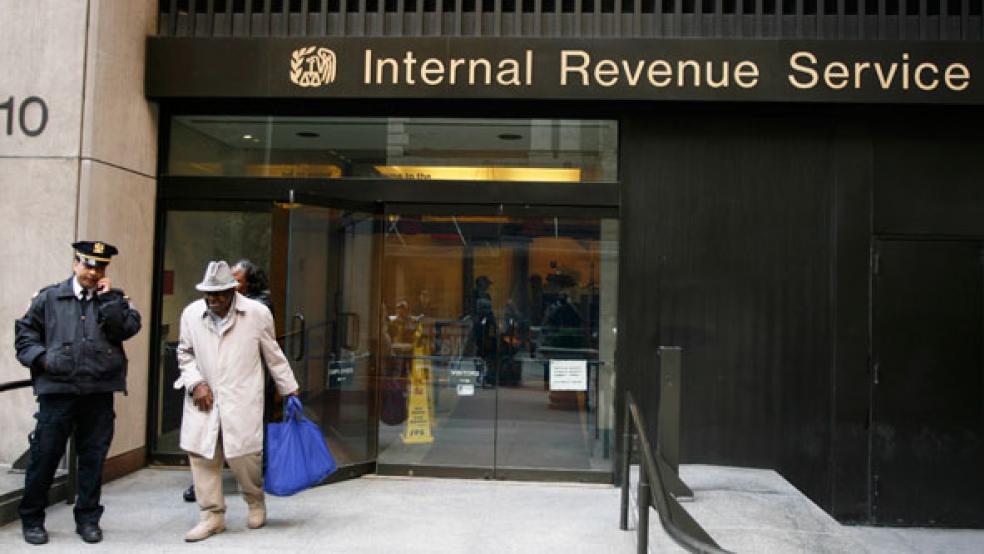The federal agency at the center of a criminal investigation for targeting conservative groups is fraught with problems well beyond political scandal.
A new report from the Government Accountability Office released Monday says the Internal Revenue Service must improve its internal controls to save tax dollars.
The report shows that little oversight at the IRS has led to erroneous refunds sent to dead taxpayers, millions of extra tax credits mistakenly allocated to the Highway Trust Fund and major miscalculations of how much the agency is owed in unpaid taxes, among other issues.
GAO auditors found calculating errors totaling at least $829 million between 10 taxpayer accounts with balances equal to or exceeding $32 million, which went undetected by the agency’s internal review procedures.
“…IRS does not have a detailed listing, or subsidiary ledger that accurately tracks and accumulates unpaid tax assessments and their status on an ongoing basis,” the report said.
The IRS also lacked an effective policy to identify deceased taxpayers- - leading the agency to send refunds to dead Americans. A surviving spouse or court-appointed representative is allowed to request a deceased taxpayer’s refunds, but the filing process is different. GAO sampled 74 refunds disbursed to deceased taxpayers during 2012, and found that 65 were invalid-based on an improper tax form, an improper filing status, or an unallowable exemption or tax credit, all of which got through the agency’s internal review process.
RELATED: 10 WHITE HOUSE SCANDALS THAT SHOCKED AMERICA
Add to this an almost comical mistake regarding the amountthe amount of quarterly excise tax revenues distributed to the Airport and Airway Trust Fund and the Highway Trust Fund. For example, in March 2012, IRS added $138 million in kerosene credits to the HTF when it should have subtracted $166 million. In another instance, IRS erroneously omitted $3 million in collections from the AATF for the third quarter of 2012.
“These errors occurred because IRS did not provide the staff assigned responsibility for performing the excise tax certifications with any comprehensive formal training on the excise tax certification process, despite the complex combination of manual and automated procedures to be followed,” the report said.
As of September 2012, 46 of 69 previous GAO recommendations for the IRS remained unfinished, and 14 new recommendations have been added. Many cite the lack of proper oversight and suggest the agency make improvements to its internal controls.
This isn’t the first time the IRS has taken heat for its lack of oversight.
Last month, the Treasury Inspector General for Tax Administration reported that the IRS improperly paid up to $132.6 billion in refunds through the Earned Income Tax Credit (EITC) over the last decade.
A week earlier, twenty-four current and former IRS employees in Tennessee were charged with fraud for falsely claiming they were unemployed to collect more than $250,000 worth of government benefits like food stamps, housing vouchers and jobless benefits.
And in February, the Treasury Inspector General for Tax Administration reported that roughly 2,560 IRS employees were assigned a BlackBerry without required management approval, costing taxpayers more than $950,000 in fiscal year 2011.
The agency is now under fire for internal problems in the most recent scandal involving IRS employees who targeted conservative groups for special reviews of their applications for tax-exempt statuses. A report from the Treasury Inspector General for Tax Administration released last night confirmed wrongdoing by the agency and blamed the incident on “insufficient oversight by IRS management.”
The scandal has sparked an IRS investigation by the Justice Department and four congressional committees. The agency’s acting commissioner Steven Miller will testify before the House Ways and Means committee on Friday.
The string of misfortune at the IRS comes as it prepares to play a lead role in the implementation of Obamacare. Under the law, the IRS is responsible for administering new tax credits to millions of Americans, as well as collecting new tax revenue.
The IRS requested $440 million as part of its 2014 budget proposal to prepare for Obamacare, and estimated that it would need about 2,195 employees to help implement the new provisions.


